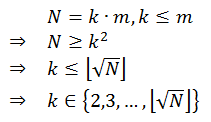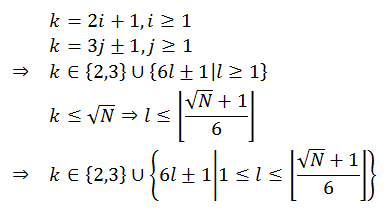Testing if Number is Prime
by Zoran Horvat
Problem Statement
Given an integer number N, N > 1, write a function which returns true if that number is prime and false otherwise. Number is prime if it has no other divisors than 1 and itself.
Example: For numbers 2, 5, 17 function should return true. For number 143 function should return false because that number is divisible by 11 and 13.
Problem Analysis
We can discover that a given number is prime by failing to prove the opposite, i.e. by verifying that there is no eligible value which divides it without remainder. The trick in this task is to properly identify eligible divisors. These should be numbers greater than one which are not equal to the number tested. Further on, there is no point in taking into account values greater than N because none of them could possibly divide N. So, by now we have constrained candidates to set {2, 3, ..., N-1}.
Now suppose that there is such a value k which is the smallest number which divides N:

This implies that m is also a divisor of N. But the fact that k is the smallest divisor implies that m cannot be less than k. From these facts we can derive one important conclusion:

This has significantly reduced the problem. But we can make a step further. There is no point in trying to divide N with even values of k, except the trivial candidate 2. This because if N is not divisible by 2, then there is no chance that any other even number could divide it. The same logic goes with number 3. If 3 doesn't divide N, then none other multiple of 3 can divide N either. This leads to an interesting conclusion about possible divisors of N: the only viable candidates that could divide N are values 2, 3 and odd numbers around multiples of 6:

This opts out roughly two out of three candidates not exceeding square root of N. And here is the pseudocode which solves the problem:
function IsPrime(n)
begin
result = false
if n <= 3 then
result = true
else if n mod 2 <> 0 AND n mod 3 <> 0 then
begin
k = 5
step = 2
while k * k <= n AND n mod k <> 0
begin
k = k + step
step = 6 - step
end
if n = k OR n mod k <> 0 then
result = true
end
return result
end
Implementation
The following C# code is a console application which implements the IsPrime function to test whether its argument is prime or not:
using System;
namespace PrimeNumber
{
public class Program
{
static bool IsPrime(int n)
{
bool result = false;
if (n <= 3)
{
result = true;
}
else if (n % 2 != 0 && n % 3 != 0)
{
int k = 5;
int step = 2;
while (k * k <= n && n % k != 0)
{
k = k + step;
step = 6 - step;
}
if (n == k || n % k != 0)
result = true;
}
return result;
}
static void Main(string[] args)
{
while (true)
{
Console.Write("Enter number (zero to exit): ");
int n = int.Parse(Console.ReadLine());
if (n <= 0)
break;
if (IsPrime(n))
Console.WriteLine("Number {0} is prime.", n);
else
Console.WriteLine("Number {0} is not prime.", n);
}
}
}
}
Demonstration
When application above is run, it produces the following output:
Enter number (zero to exit): 2
Number 2 is prime.
Enter number (zero to exit): 3
Number 3 is prime.
Enter number (zero to exit): 17
Number 17 is prime.
Enter number (zero to exit): 18
Number 18 is not prime.
Enter number (zero to exit): 143
Number 143 is not prime.
Enter number (zero to exit): 64657551
Number 64657551 is not prime.
Enter number (zero to exit): 64657553
Number 64657553 is prime.
Enter number (zero to exit): 0
If you wish to learn more, please watch my latest video courses

Beginning Object-oriented Programming with C#
In this course, you will learn the basic principles of object-oriented programming, and then learn how to apply those principles to construct an operational and correct code using the C# programming language and .NET.
As the course progresses, you will learn such programming concepts as objects, method resolution, polymorphism, object composition, class inheritance, object substitution, etc., but also the basic principles of object-oriented design and even project management, such as abstraction, dependency injection, open-closed principle, tell don't ask principle, the principles of agile software development and many more.
More...

Design Patterns in C# Made Simple
In this course, you will learn how design patterns can be applied to make code better: flexible, short, readable.
You will learn how to decide when and which pattern to apply by formally analyzing the need to flex around specific axis.
More...

Refactoring to Design Patterns
This course begins with examination of a realistic application, which is poorly factored and doesn't incorporate design patterns. It is nearly impossible to maintain and develop this application further, due to its poor structure and design.
As demonstration after demonstration will unfold, we will refactor this entire application, fitting many design patterns into place almost without effort. By the end of the course, you will know how code refactoring and design patterns can operate together, and help each other create great design.
More...

Mastering Iterative Object-oriented Development in C#
In four and a half hours of this course, you will learn how to control design of classes, design of complex algorithms, and how to recognize and implement data structures.
After completing this course, you will know how to develop a large and complex domain model, which you will be able to maintain and extend further. And, not to forget, the model you develop in this way will be correct and free of bugs.
More...
About

Zoran Horvat is the Principal Consultant at Coding Helmet, speaker and author of 100+ articles, and independent trainer on .NET technology stack. He can often be found speaking at conferences and user groups, promoting object-oriented and functional development style and clean coding practices and techniques that improve longevity of complex business applications.
Elsewhere
Video Courses
- Making Your C# Code More Object-oriented
- Beginning Object-oriented Programming with C#
- Collections and Generics in C#
- Design Patterns in C# Made Simple
- Refactoring to Design Patterns
- Mastering Iterative Object-oriented Programming in C#
- Making Your C# Code More Functional
- Making Your Java Code More Object-oriented
- Writing Purely Functional Code in C#
- Tactical Design Patterns in .NET: Creating Objects
- Tactical Design Patterns in .NET: Control Flow
- Tactical Design Patterns in .NET: Managing Responsibilities
- Advanced Defensive Programming Techniques
- Writing Highly Maintainable Unit Tests
- Improving Testability Through Design
Articles
- Here is Why Calling a Virtual Function from the Constructor is a Bad Idea
- What Makes List<T> So Efficient in .NET?
- Nondestructive Mutation and Records in C#
- Understanding Covariance and Contravariance of Generic Types in C#
- Using Record Types in C#
- Unit Testing Case Study: Calculating Median
- More...